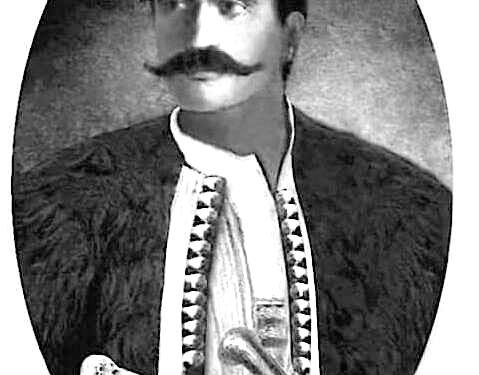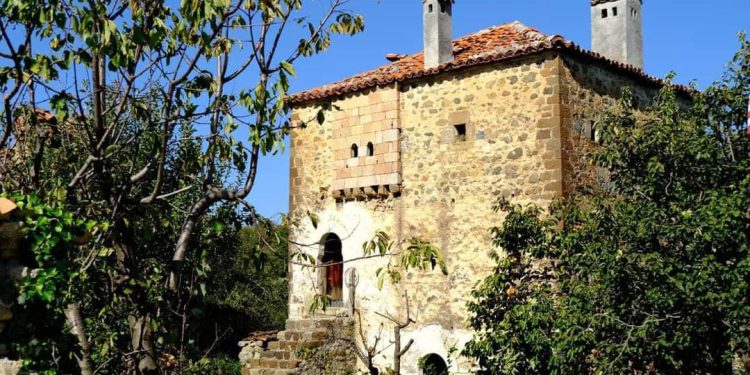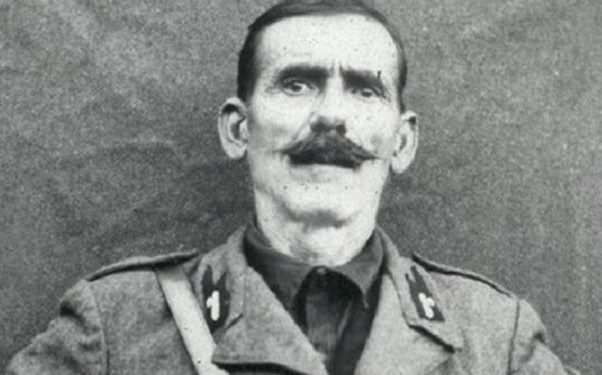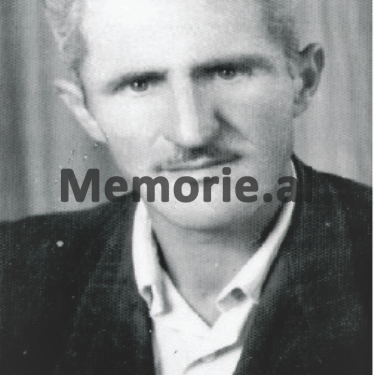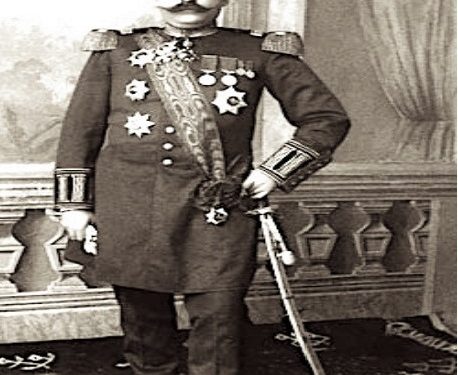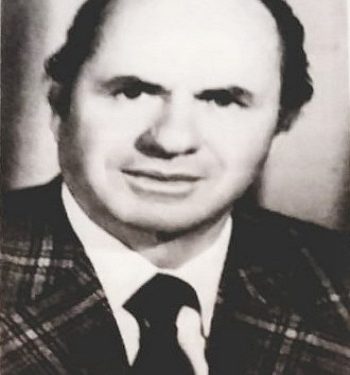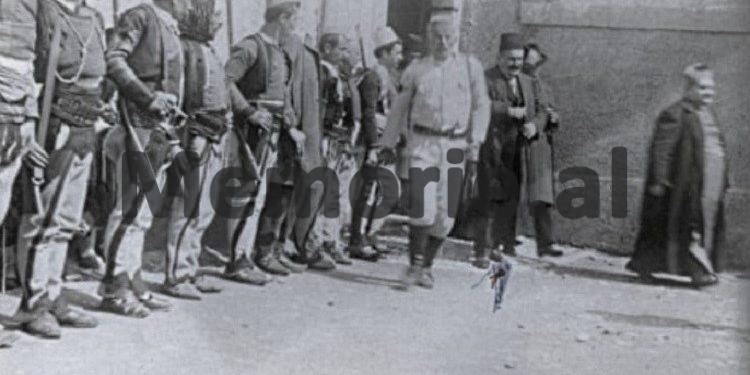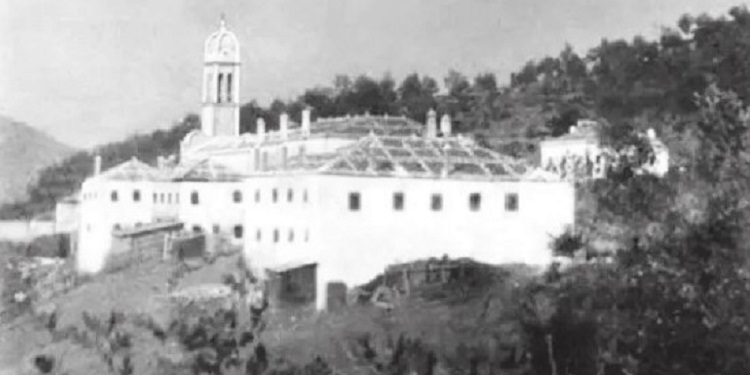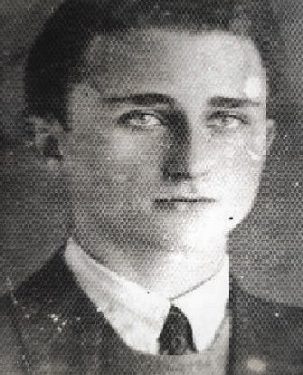By Tomë MRIJAJ
Part Two
Memorie.al / Throughout my life in my hometown and New York, I have been concerned about the early origins of my ancestors’ displacements or migrations from Mirdita and their settlement in the western part of Kosovo. Thus, over the centuries of history, we have the concentration of Catholic residents in Kosovo with origins not too far from Mirdita, who are called Fanda. Foreign travelers, chroniclers, educated Catholic clergy, Albanologists, scholars and learned diplomats of the time will write about these newcomers of the same nationality, language, customs and traditions, but separated for economic reasons or blood feuds.
One of the authors who treats the residents of Fanda as real characters is the genius of Mirdita origin, the “national poet” Father Gjergj Fishta (1870-1940). The poet dedicates some verses to the famous inhabitants of Fanda, in the well-known masterpiece “The Lahuta e Malcis”.
The Gjomarku Gate always sought to reflect the political meaning of the uprising in Mirdita and throughout Northern Albania, directly stimulated by the Gjomarku Gate. They created the ITIFAKU (League of Faith) in the summer of 1876, where the leaders of the 12 Bajraks of Mirdita joined in Shën Pal. Later, this positive example was followed by Puka, Dibra, Krasniqja, Mati, etc. Preng Bibë Doda, on June 15, 1877, sent a telegram to the Congress of Berlin, announcing that Mirdita seeks to maintain its ‘Status’ and that the Bajraks will never accept any other solution, except those that will be based on respecting the Autonomy of Mirdita. Such a fact is repeated in a second letter, signed by the heads of the 15 bajraks of Mirdita, which stretched from the Mat River, deep into Kosovo, where 11 bajraks were part.
In these historical events that have included the Dera e Gjomarku, the figure of the high prelate of the Catholic Church in Orosh, the Abbot of Mirdita, Bishop Preng Doçi, also participates, who during his spiritual and apostolic rule in his parishes in Mirdita, showed maturity and ability to keep all Albanian believers united and always respected the Dera e Kapidani of Mirdita. The Abbey of Mirdita consisted of 13 parishes, which at the center of pastoral activity had the preservation of faith in the religion of Jesus Christ, the best traditions of the Kanun of Lekë Dukagjini and the respect as always of the Principality of Mirdita – Dera e Gjomarkajve – Kapidani.
Until then, the churches and the clergy were in a miserable state. The figure of the high prelate Monsignor Doçi grew even more thanks to the respect he enjoyed for the Principality of the Door of Gjomarkaj, who, helped by the latter, immediately began to revive the renewal of the religious tradition among the people, the church organization, the repair and reconstruction of new churches, made some minor disagreements between the clergy be resolved, elevated it to the level of Abbey and created the apostolic administrative headquarters.
Turkey, taking advantage of the old age of Kapidan Gjon Mar Lleshi and the lack of his support at that time, managed to cunningly penetrate Mirdita, although the province resisted with war to preserve its Autonomy. Even during the war against Turkey, in the years 1872 – 1873, the people of Mirdita were involved in the anti-Turkish movements, where Llesh Gjoni stood out as an unparalleled leader, with virtuous virtues and a capable and brave leader.
He was killed as a brave man and his example is mentioned with respect in his homeland. 3 years later in 1876, and in the following years 1877, 1878, Mirdita, again rises with weapons in hand against the Sublime Porte, becoming the arena of clashes and thus beginning the uninterrupted series of freedom-loving wars led as always by the great Gate of Kapidan, generation after generation. There is no historical event of Mirdita, where the presence and authority of the Gate of Kapidan is not felt, the wisdom, ability and skill of solving with rifles and mind, all problems against the centuries-old Turkish invaders.
Regarding the “Albanian League of Prizren” of 1878, there have been many misinterpretations by historians before and after the communist dictatorship in Albania and during the rule of the Serbs in Kosovo. The role and contribution that the well-known province of Mirdita and the honorable citizens of Shkodra played in this event have been overlooked. The Captain of Mirdita Ndue Gjon Marku has analyzed and treated this event differently, supported entirely by authentic Albanian historical sources and not Turkish, as the so-called communist historiography in Tirana and Prishtina has often referred to.
Carefully browsing the book of the lawyer and Kapidani of Mirdita Ndue Gjon Marku, in his work, where, among other things, we read a very true historical reality that: “The Albanians accelerated their contacts and at the beginning of June 1878, the entire Albanian elite gathered in Prizren. There, the Itifak (League of Faith) was established as per the Kanun of Lek Dukagjini and created (the Albanian League for the Protection of National Lands) which was later called the “League of Prizren”. On June 13, 1878, the League of Prizren sent a Memorandum to the Congress of Berlin, with specific points on the rights of the Albanian population.
Catholics also participated in Northern Albania and Shkodra became the center of resistance from which the Shkodra Committee of the League emerged, consisting of 12 Catholic and 12 Muslim members… Considering the national awakening for the protection of Albanian lands from Montenegro, Preng Bibë Doda, without hesitation, placed himself at the disposal of the League. At the head of 10,000 fighters, he fell in Tuz and made his command center there. Unfortunately, the situation was disturbed by the anti-communist stance of Abdullah Dreni who, although he was a member of the League and himself a bestar of Itifak, sheltered Mehmet Ali Pash Maxharri whom the League considered an enemy of Albania…”! (Pages 27 – 28).
The anti-Turkish activity continues and expands from year to year. At the beginning of the 20th century (1903), the Gjomarku faction, as always renewed under the leadership of the Kapidan of Mirdita, Marka Gjoni, deals a lot with the national issue, raising the patriotic consciousness of the Mirdita people. Thanks to the respect and authority enjoyed by the leader of the Kapidan’s clan, Marka Gjoni of Mirdita, the brave men of Puka also joined them, who through several anti-Turkish actions in a joint meeting sent a Memorandum to the Vali of Shkodra and the Consuls of the Great Powers with residence in Shkodra, requesting the return of Preng Bibë Doda.
And the Memorandum compiled by the Abbot of Mirdita, Monsignor Preng Doçi, and first published in his book by Captain Ndue Gjon Marku, which concludes with these words: “The Sultan will not be recognized when our Prijis; the flag of the Han will no longer fly in our mountains, we want to be free, we want our nation to be recognized as the nation of other peoples. From now on, our flag will be that of Gjergj Kastrioti Skanderbeg, who began to fly in the era of Freedom”!
It is important to know from Albanian historiography yesterday and today, that in addition to April 6, 1911, where the brave men of Dedë Gjo’ Luli, through a glorious war, raised the Flag of Gjergj Kastrioti and on November 28, 1912, Ismail Bey Qemali in Vlora raised the Red and Black Flag, even before the aforementioned dates in Mirdita and more precisely in the village of Vinjollë, the patriot Ndue Gjoni, who is the brother of Kapidani Marka Gjoni, on April 25, 1902, raised the Flag of Albania on Saint Mark’s Day.
The memorandum was of great importance, because for the first time it shook to the core the rotten roots of the “unbreakable” Turkish Empire, which thought that behind the insurgents led by Kapidani’s Mirdita, Austria-Hungary was hiding. Even the arrival of the Young Turks did not bring any change in the so-called liberal strategy of the Young Turks, who were more fanatical and conservative than their fathers. They did not take any steps to calm the anger of the inhabitants of Mirdita led by Marka Gjoni, who demanded the unconditional release of their leader Preng Bibë Doda.
In the new situation created and after the mask of the Young Turks who came to power began to be torn off, to show that they were “liberals”, they were forced to release Preng Bibë Doda, who was received in the coastal town of Shën-Gjini, with a very great expectation from the population of Mirdita, Këthella, Malësia e Lezha and Zadrima. (p.39). The arrival of Preng Bibë Doda in his homeland brought a new renewal of the province and further increased morale and the tightening of ranks around the Dera e Kapidani of Mirdita. This personality undertook a series of necessary measures, thanks to the political, cultural experience and the healthy religious and patriotic spirit that he had enjoyed from his ancestors of the Principality of Dera e Gjomarku – Kapidani.
The years 1910 – 1911 are also year’s full of interesting historical events and episodes that have been treated one-sidedly and with great tendentiousness, without any real historical spirit by old scholars and, unfortunately, even some young people who are uninformed and not freed from the complexity of past historiography, which has taken historical “facts” as a basis. The best answer to the “historians” is given by the Captain of Mirdita, Ndue Gjon Marku, when he says: “whoever says that Dedë Gjo’Luli was kidnapped by the Captain of Mirdita and Mirdita, is anti-national, communist and Montenegrin, with the aim of keeping the spark of the conflict between Mirdita and Malsia alive, of violating the honor and prestige of the Captain of Mirdita and of weakening the strongest Catholic province of Albania.
This assertion is reinforced by the fact that those who prepare the commemoration of Dede Gjo’ Luli invite the historian of the occasion, one of the most corrupt communists of Enver Hoxha, in order to strengthen their thesis against the Kapidani of Mirdita, and this is Pal Doçi, brother of the infamous Mhill Doçi, who has charged the authorities and the people with 14 bloodsheds because, in Qafë Valmerit, exactly where the communist Bardhok Biba was killed, Mehmet Shehu has executed 14 innocent men in revenge for Bardhok Biba…”! (p. 43).
“Gjomarku’s Gate in Recent Times”, constitutes the other interesting part of the book written by the Kapidani of Mirdita, Ndue Gjon Marku. The darkest and most difficult period that Gjomarku’s Gate has gone through is that of communism, where freedoms and human rights were of no value in the face of the wild beast of the hur and the rope, with which the communist system of the anti-Albanian dictator Enver Hoxha ruled for 50 years. Mirdita and the Kapidani Gate are nicknamed “center of reaction”, “traitors”, “agents of the CIA, the Vatican” etc., words worthy only of the drafters of the kitchen of the system, which gave birth to and raised the servile servants of communism.
Dr. Mark Gjomarku is one of the worthiest representatives of the Kapidani Gate of Mirdita, who opposed the regime of Enver Hoxha with weapons in hand, with other anti-communist comrades. He was distinguished by outstanding qualities in the political field, being Minister of Internal Affairs, at the time when Mr. Mustafa Kruja was Prime Minister, during the years 1942 – 1943, and after him he held the same position. On June 10, 1944, Dr. Mark Gjomarku sent a letter to his brother, Ndue Gjomarku, who was then in Shkodra, regarding the violence being used by the communists, calling on him to unite the Mirditërs in the fight against the communists.
Among other things, he writes: “Ndue, that today begins a new political turn, not only for our country (Mirdita), but for all Albanians. The rapacious communist power threatens us. It humiliates, violates, defiles everything that is sacred to the Albanian: the feelings of the common man, his name, his qualities, pure moral virtues, family, faith, manhood, and does not recognize the Great God as God, and we have no choice but to oppose it with the powers at our disposal. Go to Mirdita and be the first to begin the resistance. On you, today the beginning of the fight for freedom and the future rests. Good luck to you”! (p. 66).
And Ndue Gjomarku goes to Mirdita and gives a warning about the danger that awaits the region from the infidels, who will destroy everything Albanian. Immediately the brave grab their weapons and take to the mountains to organize. Even nationalist parties such as ‘Balli Kombëtar’ and Legaliteti join the call of patriots who, in cooperation with the Captain of Mirdita, join the call. Northern Albania, led by Mirdita, known for her many wars against the Turkish invaders, awakens and is ready to sacrifice her life for pure Albanian ideals and freedom from the new communist invaders, who were coming to power through a deceptive ideology, throwing “donkey brains” at the naive young people!
On the other hand, the Prince of the Door of Gjomark, the Captain of Mirdita, Dr. Mark Gjomarku, convinced of their faith, relied on the determination of loyal fighters, who were ready with the spirit of sacrifice to do everything for their Captain, and did not hesitate to begin political and military (combat) activity against the communist regime that had begun to undermine the national edifice (p. 72).
The book written by the Captain of Mirdita, Ndue Gjon Marku, remains an important work in illuminating the history of Mirdita, a province with a glorious path in the history of the Albanian people. This pride and respect for this people is expressed throughout the pages of the biography of the very well-known author in Albania and the USA, a personality and a man of faith and wisdom, wisdom and ancient tradition of the Principality of Mirdita – Dera e Gjomarkut, a sucker of which Captain Ndue Gjon Marku, remained until our days.
The author, with a noble spirit and pure Albanian language learned in the lands of his ancestors in Orosh, although he has spent 80 years on his shoulders, is fresh and proud of the history of the people of Mirdita, throughout the centuries of history and with a modesty inherited from the Gate of Gjomark, the author says that I left this work to my people, my country and my ancestors, through which the Gate of Kapidani passed, deeply engraving in the popular memory the true history without political passions and emotions, but with the language of historical facts, as mother history testifies. Memorie.al




